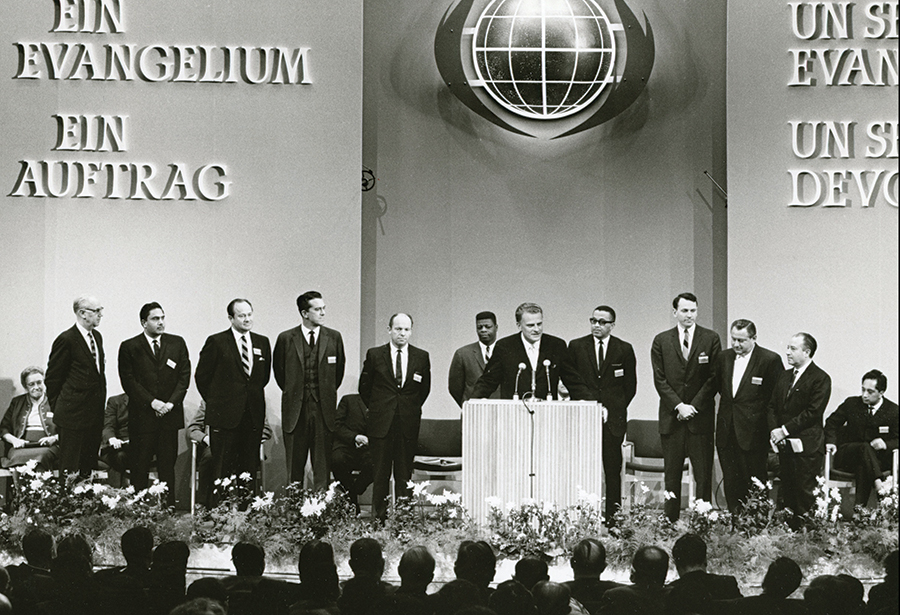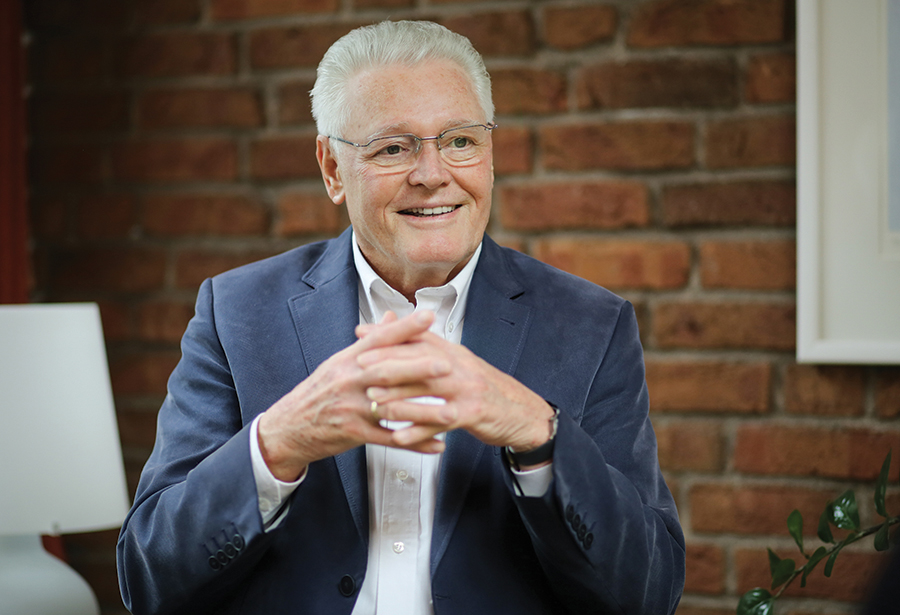Every day, thousands of Europeans pass into eternity without Jesus Christ.
In this continent, with a population of 742 million, less than 5% profess Christianity, and less than 2% are evangelical. And throughout Europe today, many millions have never even heard the saving Gospel of the Lord Jesus Christ.
All of this helps explain Franklin Graham’s burden for this part of the world.
“He senses the pulse of the situation in Europe, having been there so many times in so many countries,” said Viktor Hamm, vice president of Crusades for the Billy Graham Evangelistic Association (BGEA).
That’s why BGEA is bringing the European Congress on Evangelism to Berlin, Germany, May 27-30. “We hear from leaders all over Europe that this is the time to stand up for the Gospel,” Hamm says. “There is a fear to address any spiritual issues due to woke culture and politics, because [these factions] have silenced a lot of sound, conservative evangelical voices. And those who are speaking up feel very isolated and need to be encouraged. And this Congress will certainly encourage them to be bold.”
More than 1,000 Christians from 57 European countries and territories will attend the four-day event to hear teaching centered around the proclamation of the Gospel. The congress’ theme is Romans 1:16, where the Apostle Paul writes: “For I am not ashamed of the gospel of Christ, for it is the power of God to salvation for everyone who believes. …” The sessions will be interpreted into 10 languages.
The event comes almost six decades after BGEA’s first European Congress on Evangelism, which was held in West Berlin when the city was still divided by the Berlin Wall, under the guidance of Billy Graham, Carl F.H. Henry and other evangelicals of the day. The 1966 Congress led to similar events in Lausanne in 1974; in Amsterdam in 1983 and 1986; a North America meeting in Louisville, Kentucky, in 1994; and Amsterdam in 2000.
In the decades since, Europe has faced a rising tide of secularism that borders on hostility, says German evangelist Ulrich Parzany. However, an even bigger problem is the climate of discouragement within churches that are too tired or disillusioned to passionately proclaim the Gospel.
The spread of religions other than historical Christianity has made sharing the Gospel more challenging while at the same time providing new opportunities to proclaim Christ to people who have never heard the Gospel. The number of international migrants residing in Europe has risen from 64 million in 2005 to 87 million in 2020, overtaking Asia, and making it the largest destination for international migrants globally.

“The activity of Muslims in our country has produced a kind of critique from the secular society,” Parzany says. “You see, part of the Muslim population is committed to a radical kind of Islam.
“And when a secular society sees people of Muslim background committing crimes like driving a truck into a crowd of people, killing some, they say, ‘See? Religion is dangerous.’ And that is not only a critique against Muslims, but also against evangelicals. Those who are committed to Jesus are put in the same box with Islamists who are using violence to threaten the society.”
Hamm notes that the countries in Europe have distinct and diverse identities—culturally, politically, religiously and ethnically. Every country is developed differently, he says, and the cultural barriers to evangelism are just as diverse. “In central Europe and Scandinavia, there’s more wokeness; but historic religiosity in the East and West is slowing down the work of evangelism as much as wokeness.”
Noteworthy also is that ethnic churches in Europe are the fastest-growing ones. And they are pushing the mainline bodies that were historically considered to be evangelical and Protestant to be more bold and evangelistic.
“In a lot of cities, where you go downtown on Saturdays, you would see that it’s the ethnic evangelists who are the open-air preachers speaking to the cultures and to the indigenous people, bringing them the Gospel,” Hamm says.
In German cities, for example, it is common to see open-air preachers who are from Africa or even Latin America but only occasionally an indigenous German. The same thing is true in many other European countries.
The May event will draw all of these ethnic groups together, Hamm says. “There will be a cross section of nationalities from all over the world, because the world has come to Europe and has made Europe home.”
The Berlin meeting will connect those who are standing up for the Gospel and tell them that they are not alone. “There are pockets of evangelistic fires burning all over the European continent,” Hamm said, “and there is a sense among those who are burning for evangelism that there is little that’s happening at this time. This Congress will be a tremendous witness to the world, the woke culture, the politicians, the liberal churches. It will certainly be a great boost to the Gospel, and to Bible-believing folks in Europe.”
Generationally speaking, Hamm says young people especially are looking for a bold voice.
“They are looking for someone to lead them. And a lot of young people are disappointed in all the woke culture, they’re disappointed in the mainline churches for kind of compromising their faith. They’re looking for a bold, clear voice on what the Gospel is.”
For Such a Time
The Congress couldn’t come at a better time, Parzany says, as Christians throughout Europe have been in an ongoing debate about how to do evangelism.
“They think, does it really need words, or should we just be witnesses of the Gospel by our life and deeds? Of course, we must be witnesses. But when there is a tendency to forget that you have to speak out, to name the Name of Jesus, to tell people that He is the Savior, to explain what the Gospel is, and to give an invitation to people and challenge them to make a decision to commit their lives to Jesus and to follow Him; if that is forgotten, then we are going to have a problem.”
Europeans in Germany saw the power of proclamation evangelism firsthand during Franklin’s Festival of Hope in Essen in 2023.
When the Festival was first announced, some churches declined to participate.
“They said, ‘It is no longer the style of evangelism which we prefer to do,’” Parzany said. “But other churches did join, and 7,000 people attended the event, and many—especially young people—turned to Christ.”

For most of his life, Parzany has been preaching throughout Germany the same Gospel message that Franklin preaches. Saved as a teenager, he has pastored churches and been a vicar in Jerusalem. He was National General Secretary of the German YMCA, which in Germany is an evangelical youth movement, and a leader of the ProChrist movement. He will speak at this year’s Congress just as he spoke at Amsterdam 2000, which Billy Graham convened to prepare more than 10,000 Christian leaders for the task of global evangelism.
“I see the Congress as an important service to put an accent on the Word, on proclamation evangelism,” Parzany says. “To tell the church, ‘Don’t forget it. Social service is OK. Humanitarian relief is important, but don’t forget to speak out that Jesus is Lord and Savior, that the cross is redemption, and that He is risen from the dead.’ That has to be done by word.”
Despite early and intense persecution, Christianity became a culturally accepted faith in Europe by the fourth century, when the Roman emperor Constantine declared it legal. Europe had a tradition of state-sponsored churches, and they had broad acceptance until the last few decades.
But this is no longer true. “Christians in Europe today know that if they speak out for Jesus, they can no longer take it for granted that they will be accepted and get applause for that,” Parzany says.
“But the positive side is if people are convinced by personal encounters with Christians. So, share your life, be open, be authentic, don’t hide your weaknesses. Confess them, and witness. Tell what Jesus really means to you.”
Twenty speakers from throughout Europe and the U.S. will be featured at the May Congress. Parzany welcomes the opportunity to speak on the topic: “How the Bible Is Foundational for Preaching the Gospel.” Two centuries of historical critique from state universities have undermined confidence in the Bible. So preach the Word of God, he said, adding “if there is no Word of God, then there is no need for proclamation evangelism.”
But because the Bible is the Word of God, Parzany’s zeal for Christ has never been stronger, despite the spiritual challenges.
“We have a Lord who is risen from the dead and He will come again, and the victory is His. So, we look to Him. As an evangelist, each individual who commits his life to Jesus and testifies and witnesses that he receives forgiveness of sins and is filled with the Holy Spirit and full of joy is an encouragement, and we experience that the preaching of the Gospel is not in vain.” ©2025 BGEA
The Scripture quotation is taken from The Holy Bible, New King James Version.
